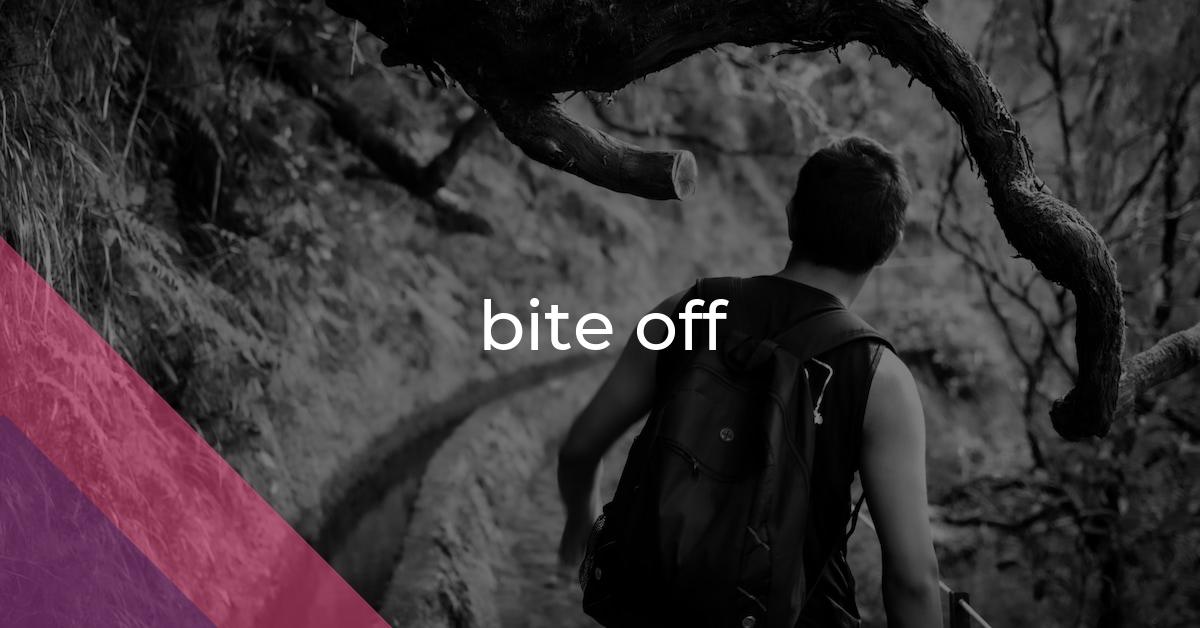bite off: Idiom Meaning and Origin
What does ‘bite off’ mean?
The idiom "bite off" means to take on or accept a challenge or responsibility, often when it seems overwhelming or difficult.

Idiom Explorer
The idiom *jump at* means to eagerly accept or seize an opportunity without hesitation.
The idiom "have a bite" means to eat a small amount of food, often as a snack or to taste something. It implies taking a quick break to satisfy hunger or try a small portion of something.
The idiom "get stuck into" means to enthusiastically and wholeheartedly start or engage in a task or activity, usually a challenging or difficult one.
The idiom "eat it" means to accept or tolerate something unpleasant or embarrassing, often with resignation or humility.
The idiom "eat an elephant one bite at a time" means tackling a large or overwhelming task by breaking it down into smaller, more manageable parts.
The idiom "dig in" means to start eating eagerly or to begin working hard or with determination.
The idiom "chomp at the bit" means to be eagerly impatient or restless to do something. It is derived from the behavior of horses when they bite down on the bit in their mouth due to excitement or impatience.
The idiom "choke off" means to stop or prevent something from continuing or progressing.
The idiom "chew on" means to think about or consider something carefully. It implies taking time to contemplate or analyze a situation, idea, or problem before coming to a conclusion or making a decision. The phrase often suggests a thorough and thoughtful examination of a matter.
The idiom "chew off" means to bite or tear a piece of something using the teeth. It can also be used metaphorically to describe the act of freeing oneself from a difficult or challenging situation. Additionally, it can refer to incessantly talking or complaining about a topic.
Unraveling the Essence
Bite off is an English idiom that describes someone who takes on more responsibility or work than they can handle. It is commonly used in both formal and informal contexts and has a figurative meaning that goes beyond its literal interpretation. The idiom suggests that the person has taken on a task or responsibility that is too difficult or demanding for them, often resulting in negative consequences. It serves as a warning to individuals to be mindful of their limitations and not to overextend themselves.
The idiom "bite off" can be found in a variety of professional and personal contexts. In professional settings, it is used to describe individuals who have taken on too much work or responsibility and are struggling to cope with the demands. This can have detrimental effects on their productivity and overall well-being. Similarly, in personal relationships, the idiom can be used to describe someone who has taken on more obligations or commitments than they can handle, leading to stress and strain in their personal life.
The exact origin of the idiom "bite off" is unknown, but it is believed to have developed from the literal act of biting off more food than one can chew. This literal interpretation likely dates back centuries, as people would have been aware of the consequences of attempting to eat more than they could comfortably manage. Over time, this literal meaning evolved into a figurative one, and the idiom began to be used to describe situations where individuals had taken on more than they could handle.
The idiom "bite off" is widely understood by English speakers and is often used to caution against overcommitting oneself. It implies that taking on too much responsibility or work can have negative consequences. When someone bites off more than they can chew, they may struggle to meet deadlines, deliver quality work, or fulfill their obligations. This can lead to stress, burnout, and a decrease in overall productivity.
Related idioms to "bite off" include "bite off more than one can chew," "chew off," "bite the big one," "bite the biscuit," and "bite to eat." These idioms share a common theme of taking on more than one can handle or attempting to accomplish something that is too difficult or demanding.
The idiom "bite off more than one can chew" is often used interchangeably with "bite off." It emphasizes the idea of taking on too much and struggling to handle the workload or responsibilities. When someone bites off more than they can chew, they may find themselves overwhelmed and unable to effectively manage all of their commitments.
The idioms "chew off" and "bite the big one" are similar to "bite off" in that they convey the idea of taking on a significant challenge or responsibility. "Chew off" suggests attempting to tackle something that is particularly difficult or complex, while "bite the big one" implies taking on a task that is beyond one's capabilities. In both cases, the idioms highlight the importance of recognizing and respecting one's limitations.
"Bite the biscuit" and "bite to eat" are idioms that also relate to the idea of taking on more than one can handle. "Bite the biscuit" suggests facing the consequences of overcommitting or pushing oneself too far. It implies that the person will experience negative outcomes or failure as a result of their actions. "Bite to eat" similarly refers to taking on more than one can handle, but with a focus on the demands of daily life and the need to prioritize and make choices about how one spends their time and energy.
The idiom "bite off" is commonly used to describe someone who takes on more responsibility or work than they can handle. It serves as a warning to individuals to be mindful of their limitations and not to overextend themselves. The origin of the idiom is uncertain, but it likely developed from the literal act of biting off more food than one can chew. Related idioms such as "bite off more than one can chew," "chew off," "bite the big one," "bite the biscuit," and "bite to eat" share a similar theme of taking on more than one can handle or attempting to accomplish something that is too difficult or demanding.
Example usage
Examples of how the idiom "bite off" can be used in a sentence:
- He bit off more than he could chew when he volunteered to organize the entire event by himself.
- She decided to bite off a small piece of the project first to ensure she could handle the workload.
- The company should not bite off more than they can chew by taking on too many projects at once.
More "Verb" idioms



